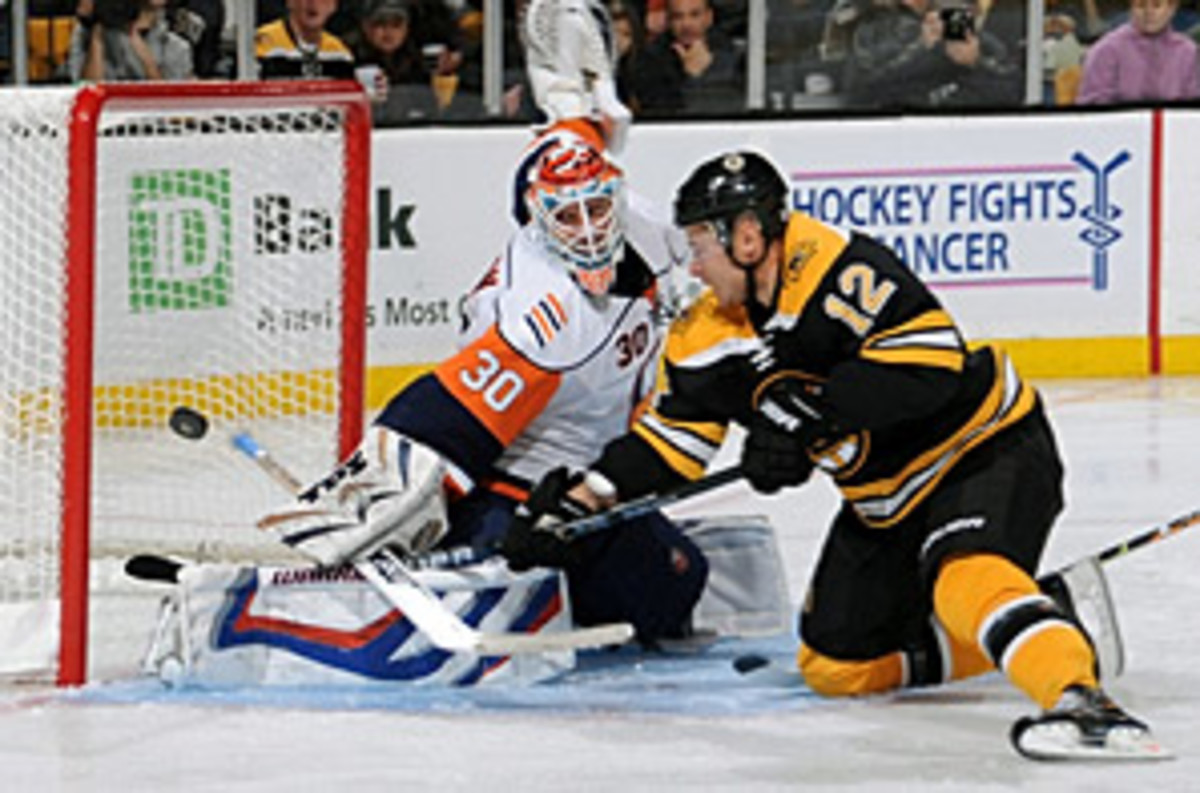More to Bruins' Kobasew trade than meets the eye


After just four years on the job, it's a bit early to compare Boston GM Peter Chiarelli to Sam Pollock, the legendary architect of nine Stanley Cup-winning teams in Montreal. But there just might have been a bit of Pollockian inspiration behind Chiarelli's decision to ship winger Chuck Kobasew to the Minnesota Wild on Sunday.
Pollock is best remembered for swapping Ralph Backstrom, like Kobasew a useful depth forward, to Los Angeles back in 1971 for a couple of spare parts. His motivation? To accommodate the unhappy Backstrom, but also to boost the struggling Kings ahead of the California Golden Seals, the team whose first-round pick Pollock had craftily acquired in an earlier transaction. Promoted to a meatier role in talent-starved LA, Backstrom chipped in 14 goals and 27 points in just 33 games. That offensive outburst helped the Kings bury the Seals in the basement and handed Montreal the first overall choice, which Pollock used to select Guy Lafleur.
No one's expecting that kind of production from Kobasew, not even the Wild. But for a team decimated by key injuries up front (Martin Havlat, Petr Sykora, Pierre-Marc Bouchard, Cal Clutterbuck) and struggling to adapt to the aggressive system implemented by new coach Todd Richards, the winger should provide an immediate jolt. His game, built around speed, physical play and consistent effort is the prototype for what Richards wants. Though he was limited to third line duty in a deep Boston offense, Kobasew can be used on the power play and perform fill-in work on the second line for Minnesota.
The Bruins received three assets in return: Craig Weller, a 6-4, 220 forward who, at 28, has probably reached his potential as a minor pro useful as an occasional call-up; a second-round pick in what looks like a shallow 2011 draft; and Harvard freshman Alexander Fallstrom (ironically, chosen with the 2009 fourth-round pick acquired by the Wild in the 2007 deal that sent Manny Fernandez to Boston).
While the pick could come in handy as a bargaining chip for the Bruins (who now own a remarkable bounty of nine picks in the first two rounds of the next two drafts), Fallstrom looks like the key to the deal. Passed over when he became draft eligible in 2008, the Swedish-born winger exploded for 87 points in his final year at Shattuck-St. Mary's. He has NHL size (6-2, 198) and solid offensive instincts, but needs to put in some time on his skating. He should benefit from remaining with the Crimson for the duration of his four-year hitch.
So what's the short-term gain for Boston? Dumping a proven top-nine winger for no immediate return seems an unnecessary challenge to their depth, especially on the day that Milan Lucic goes on long-term IR with a broken finger. But for the Bruins, this deal was as much about rattling cages in the midst of a frustrating 3-4 start as anything.
The three ramifications: it puts every Bruin on notice that their early season malaise has consequences; it clears Kobasew's $2.33 million hit off the cap this year and next, creating space either for an immediate deal to bolster the sagging blue line or possibly to extend center Marc Savard; and it gives Claude Julien a chance to juice the roster with a couple of hungry minor leaguers in Brad Marchand, Vlad Sobotka and Guillaume Lefebvre, all of whom were called up from Providence. It's not a shot at Kobasew's effort to suggest that this deal was all about addition by subtraction for the Bruins.
And maybe that's all it was. But it wouldn't be a surprise to hear that his former teammates will be rooting for Kobasew to provide a big boost to the Wild. At least enough of a lift to keep 29th-ranked Minnesota ahead of the last place Toronto Maple Leafs...the team whose first-round pick the Bruins own this summer.
Ah, Sam Pollock would be proud.
